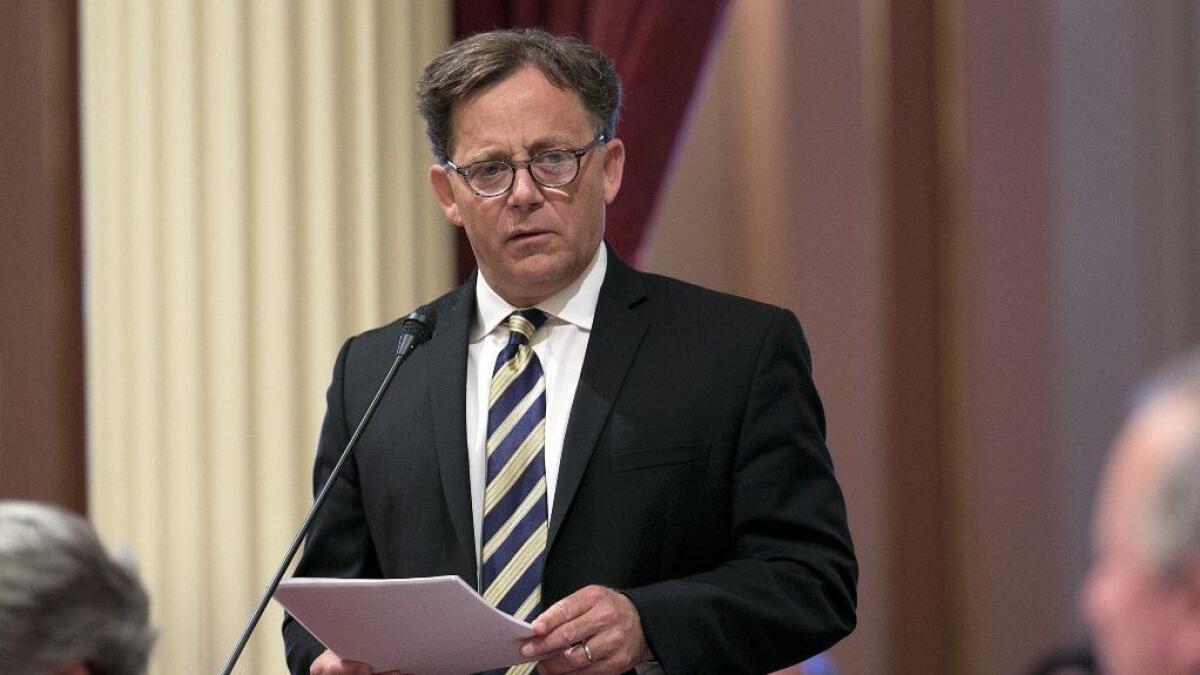California Sen. Josh Newman seems headed for removal from office for supporting higher gas tax

- Share via
Voters appeared to approve the recall of a Southern California state senator Tuesday, with significant support for removing Sen. Josh Newman (D-Fullerton) from office in all of the counties in his district.
With more than half of all precincts in Orange, Los Angeles and San Bernardino counties reporting, Newman appeared headed for defeat in the District 29 recall election. Republican challenger Ling Ling Chang appeared slated to replace the freshman legislator based on the early returns.
The state Republican Party targeted Newman over his support last year for Senate Bill 1, which increased the gas tax and vehicle fees to pay for road and bridge repairs and mass transit improvements.
Newman was one of 81 legislators who backed the measure, but Republicans sought to tap voter discontent over the higher levies in this district, a longtime GOP stronghold previously represented by termed-out Republican Sen. Bob Huff.
The election was also a proxy battle between the state’s Democratic and Republican parties and a new Republican representative will hurt Democrats’ ability to regain a supermajority in the state Legislature.
Carl DeMaio, a former member of the San Diego City Council who organized the recall, has said Newman was selected for a recall because of his narrow victory over Chang, a former Assemblywoman. Newman won that race by fewer than 2,500 votes out of nearly 318,000 cast.
DeMaio has called the move to target Newman the “gazelle strategy,” which focuses on seemingly vulnerable Democrats.
Recalls are rare in California. Just five elected officials have been recalled since 1913.
The last legislator removed from office was Doris Allen, who represented Orange County communities not that far from Newman’s home until she was ousted in 1995.
Newman spokesman Derek Humphrey said in a statement late Tuesday that the campaign was anticipating a long night as more votes were counted.
“The Republicans spent a lot of money lying to voters to get this on the ballot,” Humphrey said. “And they got exactly what they wanted — a re-do of the 2016 election but with only half the number of voters participating. That’s the definition of an undemocratic special interest power grab.”
Live coverage of California’s primary »
The recall election also tapped into voter discontent about Senate Bill 1.
A recent USC Dornsife/Los Angeles Times statewide poll found that 51% of California voters want to repeal increases to the state’s gas tax and vehicle fees. Those numbers are higher in Orange and San Diego counties and the Inland Empire, where 64% support a repeal. The question will appear on the November ballot, and potentially be a turnout driver for GOP voters.
District 29 mostly falls in Orange County, but also includes some of Los Angeles and San Bernardino counties. Democrats have a slight edge over Republicans when it comes to registered voters — 36.2% compared with 33.4% — and 26.2% of voters claim no party preference.
The state Republican Party has spent more than $1.2 million on the recall election, including more than $490,000 to back Chang. Party spokesman Matt Fleming accused Newman of “being out of step with his district.”
Democratic leaders, including Gov. Jerry Brown, helped raise more than $4 million to fight Newman’s recall. Also, the Senate Democratic Caucus allowed the state Fair Political Practices Commission to lift a $4,400 cap on contributions to Newman’s anti-recall campaign from other senators.
In recent weeks, campaign workers for Newman dressed up in bull costumes and stood on busy intersections in the district, holding signs that read: “The recall is bull—.”
Everything you need to know about the June 5 primary »
Twitter: @dakotacdsmith
UPDATES:
11:30 p.m.: This article was updated with results after polls closed.
This article was originally published at 12:30 p.m.
More to Read
Get the L.A. Times Politics newsletter
Deeply reported insights into legislation, politics and policy from Sacramento, Washington and beyond. In your inbox three times per week.
You may occasionally receive promotional content from the Los Angeles Times.










